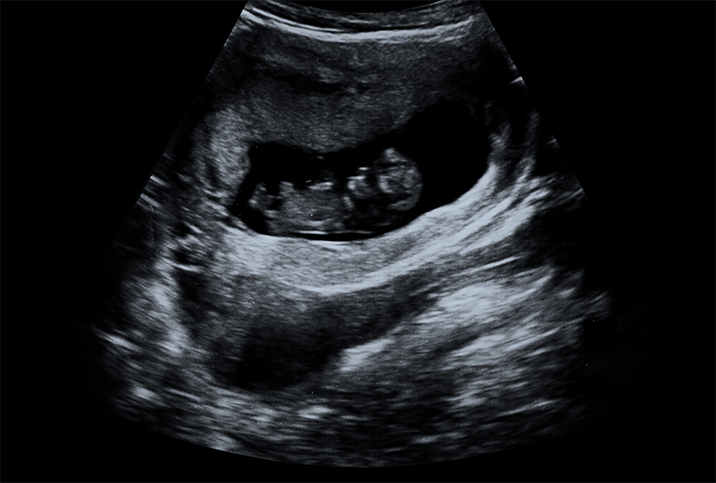What to Know When Expecting a 'Rainbow Baby'

Molly Hope felt she was a mother from the moment she became pregnant with her first child, Blake. For nine months, she eagerly planned and daydreamed, enamored with her unborn son and the life she envisioned for her soon-to-be family of three. But on the day of his birth, her bliss was ephemeral, as Blake's life ended as soon as it began. Although he appeared healthy throughout the pregnancy, he entered the world unable to breathe.
"It was only after I birthed him and he didn't scream, cry or move [that] we knew something was wrong," Hope recalled. "His heart was beating, but he couldn't breathe. They did CPR for 32 minutes, and after they stopped, to no avail, his heart stopped beating, too."
Blake died of perinatal asphyxiation, a primary cause of neonatal mortality that claims about 900,000 deaths each year, according to the World Health Organization (WHO). Also called birth asphyxia, it is usually a result of complications during childbirth.
The earth-shattering grief of losing a child understandably deters many parents of "angel babies"—those lost to miscarriage, stillbirth or ectopic pregnancy—from trying to conceive again. But Hope was "desperate" to experience all she had missed with Blake. Two years later, that opportunity came, when she gave birth to her second son, Jenson, a vibrant "rainbow baby," a term coined for children born or adopted after parents suffer a miscarriage, stillbirth or neonatal death.
She and her partner have since welcomed a third boy, Reuben.
"Being a rainbow parent is an honor," said Hope, who resides on Isle of Sheppey in the United Kingdom. "It's a blessing I didn't expect to be brave enough to attempt to do, having already carried and lost a beautiful baby boy."
Grim statistics
Although stillbirths and neonatal deaths are relatively rare in the United States and the U.K., miscarriages are common, especially in the first trimester. About 10 percent to 20 percent of pregnancies in the U.S. end in miscarriage, according to Mayo Clinic, and 1 in 175 babies in the U.S. are stillborn, reports the Centers for Disease Control and Prevention (CDC).
For every 1,000 live births in the U.S., approximately 5.6 die before their first birthday, according to the March of Dimes. Lisa Becht, M.D., a reproductive endocrinologist at HRC Fertility in Newport Beach, California, said several factors can contribute to such losses, with genetic abnormalities being the most prevalent. Yet, in about 50 percent of miscarriages and 33 percent of stillbirths, there is no identifiable cause, according to Becht and Cleveland Clinic. Even when the reason is discernible, it is often unpreventable.
Pregnancy after loss
According to Hope and Becht, regardless of the cause of an angel baby's death or when they passed, carrying, delivering and raising a rainbow baby can be quite different from the "typical" child-rearing experience. Although most expectant parents undergo a medley of emotions, from exhilaration to trepidation, these feelings can be particularly intense and varied for those who have endured loss.
When a child dies, a parent's sense of trust can pass along with them, according to Courtney Glickman, Ph.D., L.P.C., a mental health therapist who specializes in trauma at the Collective Healing Center in the Washington, D.C., area.
"I know from personal experience of pregnancy loss that I struggled with the grief of the life I dreamed of having with my baby," she said. "The walks in the park, her baby giggle, getting to see her grow older and develop. My anticipated parenthood had been stripped away from me in a moment. I felt a violation of my expectations and hopes. As a therapist, I hear similar accounts from my clients. It is destabilizing to feel a loss of trust, safety and control in one's own body."
This destabilization and persistent grief can complicate feelings of exultation and optimism when pregnancy occurs after loss, according to Glickman, Becht and Brandon Eddy, M.S., Ph.D., a therapist and assistant professor at Kirk Kerkorian School of Medicine at the University of Nevada, Las Vegas.
"There is a significant fear due to that powerlessness she felt," Glickman continued. "Women want to hope, but that hope is vulnerable."
"When couples who have experienced miscarriage, infertility, etcetera, become pregnant again, they often experience a significant increase in anxiety during the pregnancy," Eddy said. "They experience intense fear that history will repeat itself. This anxiety can lead to panic attacks, which can be debilitating."
The next pregnancy can be scary
Parents who have a first-trimester miscarriage with no identifiable medical reason aren't usually at increased risk for future miscarriages, according to James Miller, M.D., who practices at Monarch OBGYN in Wooster, Ohio. Similarly, if no medical cause is indicated in a stillbirth, the risk of a subsequent stillbirth is only slightly heightened. Whether or not a cause is identifiable, healthcare providers tend to offer enhanced testing and monitoring services to parents of rainbow babies to diminish risk and increase the chances of a healthy pregnancy and delivery.
Nonetheless, ultrasounds, doctor appointments and events connected to the loss, such as bleeding or reaching the gestational age when the loss occurred, can be acutely triggering and may cause post-traumatic stress, according to Becht. Although overcoming these hurdles can bring about relief, anxiety may not dissipate for some time after the baby is born, she said.
"A pregnancy with a rainbow compared to an 'average' pregnancy is very different because you know the heartache of what could go wrong," Hope said. "You panic over every single twinge, pain and ache. Every time the baby doesn't move when you encourage them to, it sends you straight to the hospital to be checked. With a rainbow pregnancy, I don't think a parent can fully relax and enjoy it as much as they did before having their angel baby. We know firsthand what could happen and at any stage."
Abbe Feder, who gave birth to twins after a miscarriage, an ectopic pregnancy and several failed in vitro fertilization (IVF) attempts, agreed.
"It's nearly impossible to enjoy any part of pregnancy if you've experienced pregnancy loss or failed embryo implantation," said Feder, a certified life and fertility coach and the founder of InCircle Fertility in Los Angeles. "After my own six years of infertility, I always expected some proverbial shoe to drop and some kind of heartbreaking disappointment to smack me in the face. There is a perpetual anxiety that hangs over you."
Guilt can interfere as well, according to Hope, who recalled worrying that people would think she was "replacing" her firstborn.
"The guilt is sometimes the hardest feeling to shift," she said. "Once you deal with the guilt of one feeling, another arises. I guess it's part of grief."
"Some might feel like it is a betrayal to the pregnancy they lost," said Caitlin Opland, L.C.S.W., a counselor at ThriveWorks Counseling & Psychiatry in Loveland, Colorado. "Some might feel guilty for feeling love toward a rainbow baby. Some might feel as if they don't have a right to this child."
All of these feelings are normal, Opland said, and can co-occur with elation and optimism.
In order to cope, Hope and many of the professionals mentioned here recommended seeking support from loved ones and healthcare providers, including a mental health counselor. Joining a support group, such as Pregnancy After Loss Support (PALS), can also be beneficial, both during and after pregnancy, Becht added.
"During your rainbow baby pregnancy, do not be afraid to seek help," Miller said. "It is very important to stay ahead of your anxiety and depression during your rainbow baby pregnancy to improve your pregnancy outcome and overall health."
Welcoming a rainbow baby
"Welcoming a rainbow baby is incredibly emotional," Hope said. "I didn't know what I had lost when my firstborn died, never experienced a sleepless night, breastfeeding or being someone's whole world. It highlighted everything I had lost but also made me whole."
Although she didn't always feel it in the moment, having experienced such profound loss made her grateful for the sleepless nights and her sons' cries, she continued.
"It was a reminder that they were here safely, and I was being a mother practically as well as to our angel," Hope said.
"My twins are now 4, and I still can't believe they're here," Feder said. "I tell them all the time."
Many rainbow baby parents feel a heightened sense of gratitude throughout their child's life. But grief, guilt and similar emotions may endure.
"While they are thrilled to be pregnant and deliver a live baby, the stress and grief they have been through can still weigh heavily on them postpartum," Becht explained.
Eddy, Feder and Glickman recommended accepting and acknowledging all feelings without judgment.
"I'm a big believer in 'feel it to heal it,'" Feder said. "You have to be able to feel and experience your full range of emotions to cope with them and to move on, in whatever way feels best. Feelings are not wrong. So if you're feeling conflicted about sharing the joy of your rainbow baby while you may still be mourning a lost one, it's OK. You're allowed. You're encouraged…Similarly, if you didn't take the time to grieve when the loss happened, it may creep up unexpectedly in place of the joy you thought you'd feel. I feel so strongly that life is a never-ending balance of holding space for both joy and grief. Rainbow babies are the perfect example."
Eddy agreed, asserting there are no "bad feelings," simply some that are more difficult to process.
"We need to make space for our feelings, rather than suppressing them," he said. "It is quite common for people to say, 'A part of me feels this way, but another part of me feels this way.' That is perfectly normal, and it is possible to experience multiple emotions at the same time. Talk through your feelings with your partner, family, friends, loved ones and a therapist if necessary. A therapist can be especially useful in helping parents discern what is normal and expected versus what may be postpartum anxiety or postpartum depression."
It might take a village
Although some degree of complex emotions are standard and expected, these healthcare professionals cautioned that people who have experienced a loss are more susceptible to postpartum depression (PPD) and anxiety, serious psychiatric conditions that require professional care.
"This manifests differently for different women, but there are often common themes among the women I work with of the newborn becoming hurt [or] ill, not wanting to leave the baby in the care of others, fear of failure, and worry that they are not spending enough time with the baby," Glickman said.
"I can personally relate to all of these," she continued. "I wanted to become a mother so desperately, and my world felt like it shattered the moment I went in for that scan as I was told my baby had died. And yet the world moves on even though you don't want it to, even though you want to rewind to the moments before when you were daydreaming about baby names and bringing her home for the first time. That heart-wrenching feeling was so deep that it shook the foundation of my being. Bringing my son home, I feared that I would fail him. I feared that I wouldn't be able to control or predict all the dangers that could harm him. Being confronted with the fragility that is life was a daily reminder with this small being so reliant on me for protection and security."
Many people can benefit from having a safe space—be it a support group or therapist's office—to share these intrusive thoughts, Glickman said.
"As a therapist, I was aware that I was experiencing anxiety but thought I knew the tools to handle things on my own," she said. "Once I accepted that in order to care for my son, I needed to care for myself in a new way, things began to shift. For myself and so many women I work with, the regret is not seeking support sooner. The saying 'It takes a village' is so true! We are not meant to do this alone or with just a partner. We need a community. Most new mothers feel isolated, but rainbow mothers can experience this at heightened levels. Due to the stigma around loss, many mothers feel as though they struggle to find a community of women who understand their experience."
Complicated emotions tend to subside with time, but an angel baby's memory never fades, and for some families, their loss is a wound that never fully heals. It is not uncommon for parents to continue holding grief and joy simultaneously for years or a lifetime.
Hope has honored Blake by raising funds for the U.K.-based baby loss charity Abigail's Footsteps, in addition to more personal tributes.
"Honoring our firstborn is something we do every birthday, every Baby Loss Awareness Week, and we always include his little brothers," Hope said. "We light a candle in the evening and say happy birthday and send kisses up to heaven after spending the day as a family. Our children are too young to understand now, but they will grow up to know they have a big brother in the sky."


















